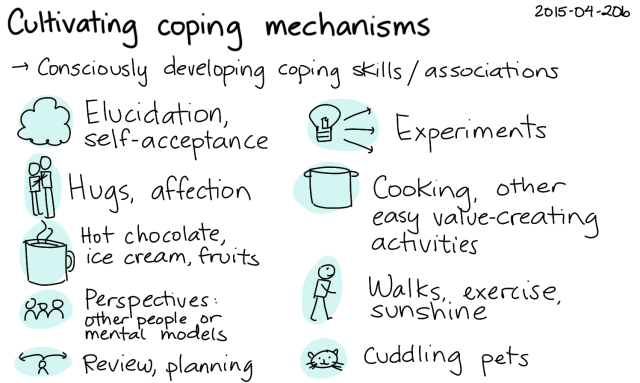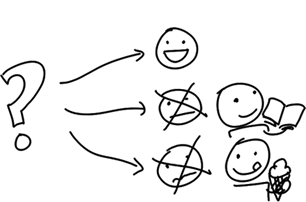Cultivating coping mechanisms
Posted: - Modified: | happy, reflection2015-04-20b Cultivating coping mechanisms – index card #self-care #coping
I'm not sure if other people do this, but I figured I'd write about how I deliberately cultivate certain coping or self-soothing behaviour, in case it resonates with anyone.
Whenever I come across a mildly stressful situation, I use that as an opportunity to practice and reinforce ways to deal with it. For example, I like getting hugs, so I've learned to create that feeling for myself and I've learned to ask people for hugs when I need it. I associate hot chocolate with comfort and self-care instead of having it as a regular luxury, so it's there as a treat when I really need it. I tell myself that it's impossible for me to stay sad when I'm eating ice cream, and that becomes the case. I practise elucidating what I'm feeling, accept it, and experiment with ways to improve the situation. I give myself permission to stop trying to do things that require a lot of thinking and energy, and to instead focus on cooking and other easy ways to create value for myself and others. I figure out good walks and relaxing forms of exercise. I guiltlessly spend time cuddling the cats.
Sometimes I'll focus on remembering what it feels like to be comforted and happy and safe while, say, mind-mapping thorny feelings, and eventually it becomes easier and easier to do so.
When more stressful situations come, I have some idea of what works for me, and I have positive associations around those techniques. I wonder if it's a little like clicker-training yourself… =) Anyway, I've been finding it easier and easier to deal with life's little curveballs. I don't know the magnitude at which things will start to overwhelm me again, but it's nice to know that I can handle more and more. In the meantime, even obstacles can be fuel for greater happiness and equanimity. =)



 Happy people are sometimes derided as unrealistic Pollyannas, other people’s way of bringing them down to earth. I’ve heard it from people who don’t yet understand how I can be so optimistic. The dictionary defines “pollyanna” as an excessively or blindly optimistic person. Curious about this, I requested Eleanor Porter’s book
Happy people are sometimes derided as unrealistic Pollyannas, other people’s way of bringing them down to earth. I’ve heard it from people who don’t yet understand how I can be so optimistic. The dictionary defines “pollyanna” as an excessively or blindly optimistic person. Curious about this, I requested Eleanor Porter’s book ![sketchnotes-gretchen-rubin-happiness[1] sketchnotes-gretchen-rubin-happiness[1]](https://sachachua.com/blog/wp-content/uploads/2011/01/sketchnotesgretchenrubinhappiness1.png)